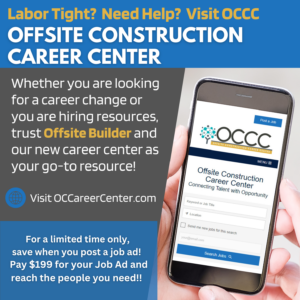More young people will be drawn to offsite construction if the opportunities are well structured. These success stories illustrate that fact.
As someone involved in workforce development, I often hear frustrated employers generalizing that young people do not want to work hard. Like most generalizations, this is one is also untrue. Given the right opportunity, young people will put their whole selves into a career and stories of them doing so aren’t hard to find – if you look.
I recently spoke with five eager and talented young people about their path into offsite construction and their dreams for the future. I hope that their stories help change the way we look at, find and train young people seeking employment in the industry.
When Experience Drives Purpose
Peter Core was working with the Boise Rescue Mission in Boise, Idaho when he first heard about modular construction and a company called Autovol that did not yet exist. “I know what it’s like to not have a home,” says Peter, who was homeless for a period. Autovol was talking about affordable housing, the lack of which is a driver of homelessness. He wanted to be a part of their vision.
Peter brings a thoughtful perspective to his work and admits that his first month was challenging. “I had to get used to getting my hands dirty and keeping up with the fast-moving production atmosphere,” he says. But he soon found his groove. He started installing floor insulation, but quickly advanced to running the tool cage. Then Steve Clough, head of the estimating department, took him under his wing and taught him the ins and outs of estimating.
Ultimately, what sold Peter was the culture of learning and support and the fact that his ideas were valued. “I knew if I saw something I thought we could do better I could say something and change would happen.”
His advice for young people? Keep an open mind.
“Sometimes it takes stepping out and giving something new a shot,” he says. “I believe modular is the way of the future, so starting to learn how it works now would put an individual in a good spot.” He sees a great opportunity for the younger generation to get in on something that will only grow.
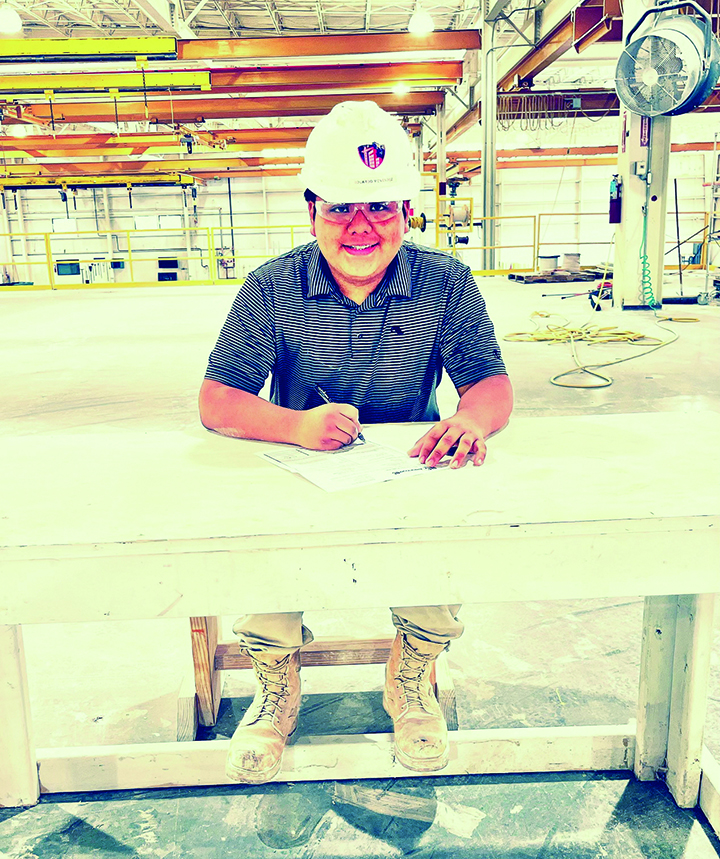
Taking Advantage of Opportunities
Eduardo Mendez was part of Richmond Senior High Schools’ Career Technical Education (CTE) program when his teacher told him about an opportunity at a modular factory. He was curious, so he gave it a try.
It was his first job. He began working part-time in the floor and wall framing stations during high school and is now installing sheetrock and backsplashes. “I’m still learning,” he says. “And it’s been fun.”
Mendez, who is now a student at Richmond Community College, credits Clifton Dial, former Training and Development Manager at Volumetric Building Companies, in helping him understand job expectations, processes and safety training. Dial hired Mendez through a program called ApprenticeshipNC.
Apprenticeship programs that register with ApprenticeshipNC benefit both employees and employers. Companies receive $2000 per apprentice to spend on training supplies such as tools and materials. Additionally, since Mendez began his apprenticeship in high school, he receives a 100% tuition waiver on classes that the employer and the college deem necessary for the job he will be doing. And maybe the biggest benefit for the employer is a 50% salary reimbursement to the employing company during the first year of the apprenticeship program.
“There are lots of opportunities at the state level for factories to receive monetary help with recruitment for high school and community college students,” says Dial. Other states have similar programs, but under different names.
Because of his work experience, Eduardo is now exploring a career in Civil Engineering and is taking electrical, plumbing and HVAC classes in college to enhance his understanding of how all construction components work together.
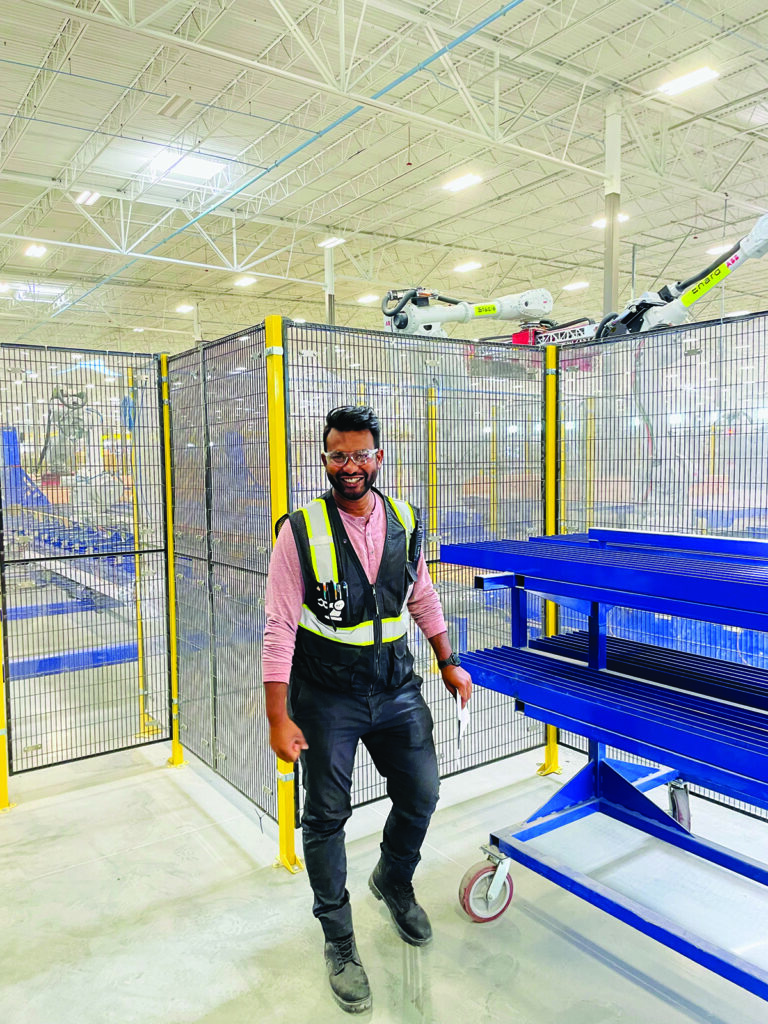
The Accidental Modular Engineer
Exposure and exploration will be essential to building the future workforce for offsite construction. Just ask Chandra Pittu.
Growing up in India, Chandra discovered an early obsession with Aerospace Engineering. After graduating from the MLR Institute of Technology, he applied to a few American universities and ended up at the University of Texas at Arlington because of its top-notch Mechanical Engineering program. In 2018, he began applying to aerospace companies in the US.
“I was submitting resumes everywhere,” he admits. “I saw a job opening that included automation but had no idea what the company was.”
The job was in a field he hadn’t considered. The company was Prefab Logic and after an initial interview with then-CEO Curtis Fletcher and a follow-up with [title?] Rick Murdock, Pittu accepted an offer to become Employee #3 at Autovol.
Despite this being a new direction, he embraced it because his ideas were valued. “Everything is out there and discussed,” he says. Pittu thrived in the hands-on, problem-solving environment and culture of learning. And he hasn’t had a single day of remorse, even after receiving an offer for his dream aerospace job. “I told Rick, ‘I got this offer, but I’m not taking it, I’m staying here,’” says Chandra. “And Rick told me if I wanted to take it he would support me 100%. I have never forgotten that conversation.”
Pittu has also come to understand his real passion. “At the end of the day, it’s more about the difference you are making, the value you hold,” he says. “It’s not about the actual engineering; it’s about what the engineering allows me to do and to solve. We are trying to solve housing challenges.”
He credits his parents for the opportunities that led to his current work. Watching their son work so hard to get into Aerospace Engineering, they found it “interesting” when he started down a new path. He now has their full support.
Chandra is excited to help change the way people see the potential of the construction industry—an industry he believes has been taken for granted and neglected. He would love to see more hands-on experiences available to students to help them develop their creativity and practice collaborative innovation.
“The US education system is missing the opportunity to allow kids to explore what is out there,” he says.
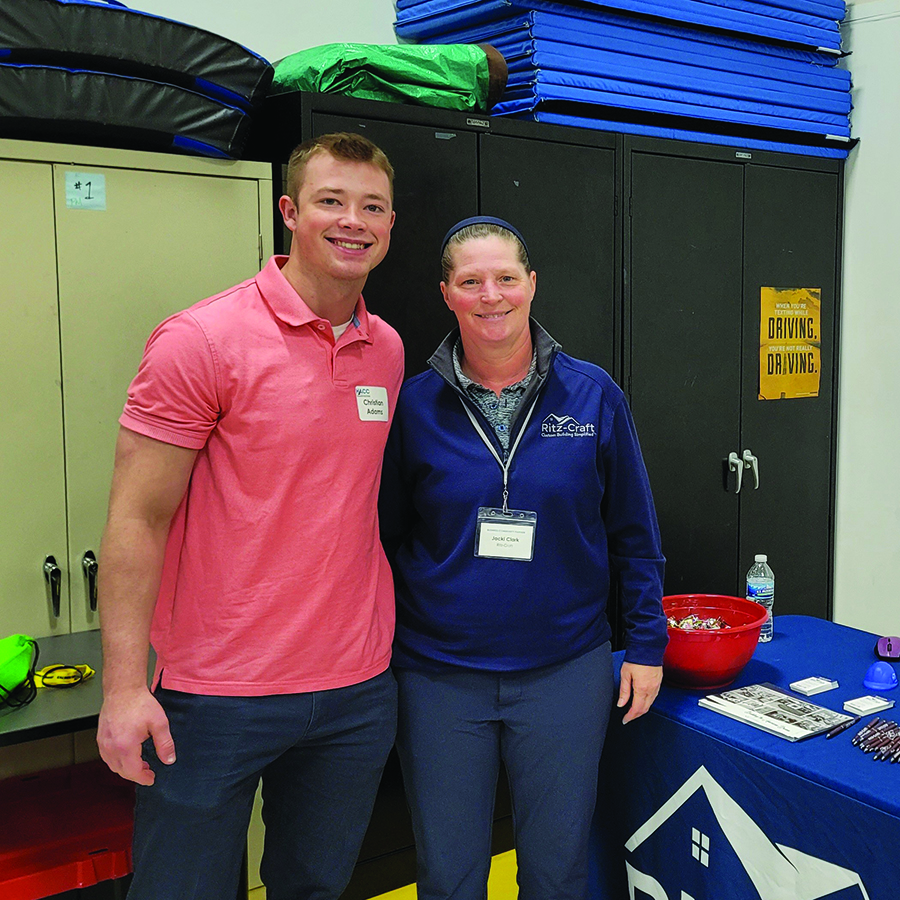
The Value of Knowing What You Want
Chris Adams, a recent graduate of Jonesville High School in Jonesville, Michigan, began thinking about his future career early on. In the 8th grade, he and a friend built a table through an Industrial Arts class and sold it for $300. He was hooked. He joined the Construction Trades program in high school, a two-year program where schools offer Juniors and Seniors hands-on building experience.
“I used to think it was crazy that people [knew] how to build a house from the ground up,” Adams says.
He applied to modular home manufacturer Ritz-Craft, where his application came to Talent Manager and Safety Director, Jacki Clark. Clark, who is responsible for the company’s work-based learning program, fast-tracked Chris. He began working part-time at the Ritz-Craft during his senior year of high school, then was hired full-time after graduation.
Clark’s job includes ensuring that each work-based learner is the right fit for their team. “Students need to be capable of learning to make the opportunity worthwhile for everyone,” she says. “It’s not something everybody can [or wants to] do.”
Chris’ curiosity started him on his journey into construction and, ultimately, into offsite. But he says that Clark has been instrumental in his success. “Jacki has looked out for me and been on me about getting things done,” says Adams. “Without her help, I doubt I’d be as successful in this environment as I am.”
Clark’s responsibilities at Ritz-Craft are important for building culture and finding the right employees. “Culture is the toughest thing to change,” says Clark. She uses regular self-evaluations that require employees to be honest about how they see their progress and work, but also provides an opportunity to evaluate leadership in the company.
“The most important part is the follow-through,” she says. “We have a 48-hour period where we require a response to any negative feedback that is provided by an employee. This is our commitment to them for continuous improvement.”
Chris plans on continuing to learn and gaining as much knowledge as possible. “I know it will make me a better worker and create opportunities.” His advice to young people is to give construction a try.
“Even if you don’t turn it into a career, the knowledge you gain could help you save a ton of money or allow you to help a friend. It could also be a wonderful side job. Jobs in modular construction provide you with the skills to build the right way.”
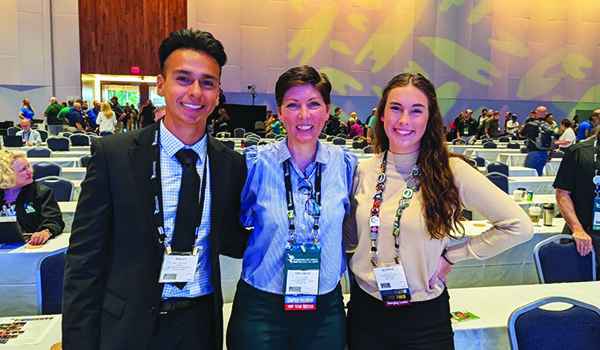
Code Blue to Building Codes
Alyssa Stone is an 18-year-old Instructors Assistant for the Residential Construction program at the Career Technical Education Center (CTEC) in Salem, Oregon; a position she began when she was 17. Through the International Code Council she serves as the President of the Chemeketa Chapter and was selected as a 2022 Board Shadow recipient. She’s spoken at events and is a Certified Residential Building Inspector, Residential Plans Examiner, Residential Mechanical Inspector and Permit Technician. She has experience with ceiling grid installations and has led electrical inspections in a factory.
But she can’t get hired as an inspector because of her age and lack of on-the-job experience, even though the field she is applying to can’t find workers.
In middle school, Stone dreamt of taking woodshop, but was pushed towards nursing school; a career she didn’t want. She began writing essays to her parents to convince them to allow her to attend the Construction Trades program at CTEC. After her third essay, they agreed.
Instructor Curtis Fisher suggested the Building Inspections program where she read the entire International Residential Code (IRC) book and “found it interesting.” During her senior year, Alyssa was hired at Modern Building Systems (MBS).
“I didn’t realize how efficient factory work was,” she says. “We built a shed at CTEC, but it was a slow process. At [MBS] the modules I was working on yesterday were being shipped [the next day].”
Her plan reading experience allowed her to work with electricians installing light fixtures into ceiling grids. She did pre-checks and removed panels for electrical lighting inspections, allowing inspectors to complete their verifications. Not surprisingly, they were impressed by her age and knowledge. She sought learning opportunities with the cabinet, finishing and roofing stations as well.
Alyssa wants to become an electrical inspector. The fact that it requires five years’ experience, which she doesn’t have, has made job hunting difficult. To obtain plumbing and electrical inspection certifications she would have to become a journeyman (and is considering this), but it would make the path much longer. Alternatively, she would need five years of experience doing plumbing and electrical inspections out of state so she is considering Vancouver, B.C., Seattle, Wash. and Boise, Idaho. But, first, she would have to leave her position at CTEC.
Stone believes the industry would be better served by flexible, “non-prescriptive” solutions (much like what we have in building codes). For example, a fast-track path removes unnecessary roadblocks, less emphasis on degrees, certifications and age, and more emphasis on a willingness to learn and grow.






